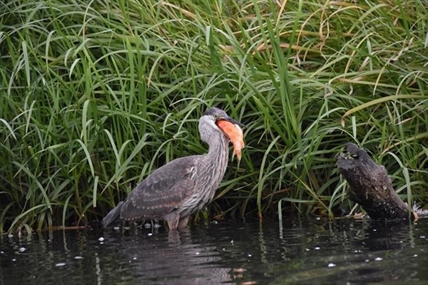Elevate your local knowledge
Sign up for the iNFOnews newsletter today!
Sign up for the iNFOnews newsletter today!
Selecting your primary region ensures you get the stories that matter to you first.

KAMLOOPS, B.C. – Goldfish — some nearly as big as a football — are invading British Columbia's lakes and quickly spreading, putting native fish populations at risk, a researcher says.
Brian Heise, an associate professor in the department of natural resource sciences at Thompson Rivers University, says thousands of large, invasive goldfish have multiplied in bodies of water around the province.
"They're not the little fish you see in the pet store. They actually get quite large, and they have potential to get even larger, especially probably in some warmer, more productive waters," he said.
Heise, a former chair of the Invasive Species Council of B.C., said female goldfish can release 50,000 eggs at a time, three times a summer.
"Females don't even need a male (to reproduce). They have a special process called gynogenesis in which the female will get the sperm from a different kind of minnow … to start the eggs developing, even though they're not fertilized," he said.
"And so she produces clones of herself. So, they're very good at spreading rapidly."
The goldfish compete with native species for food and space, and carry parasites and diseases that can spread to other fish, including the salmon population, he said.
Over the last decade, Heise says goldfish populations have spread from the Vancouver area to lakes in the northern and Interior parts of the province.
One of the most common ways to capture the goldfish is through a process called electrofishing.
An electric current is passed through the water to stun the fish, allowing them to be scooped up.Heise said the method allows native fish to be easily revived and goldfish removed.
"The downside is that you're not killing all the fish. Therefore, you have to keep doing it again and again and again," he said.
"And it's actually quite an expensive process. To go into a lake and shock for a couple of days would probably cost you $10,000."
He said the province needs to continue funding electrofishing efforts but it also needs to work with pet stores and the pet industry so customers can return unwanted animals instead of dumping them.
"I think that if pet stores are bringing in exotic animals, and they're selling them to the public, it behooves them to then follow up and make sure that the public realize that you can't put these creatures in the wild once you finish," he said.
"It doesn't matter whether it's a snake, a turtle, a bird or a fish, you just can't put it into the wild. It's often going to be harmful to that animal because they're not adapted to that place, but also we're going to harm our local animals and plants."
This report by The Canadian Press was first published March 3, 2023.
News from © iNFOnews.ca, . All rights reserved.
This material may not be published, broadcast, rewritten or redistributed.

This site is protected by reCAPTCHA and the Google Privacy Policy and Terms of Service apply.
Want to share your thoughts, add context, or connect with others in your community?
You must be logged in to post a comment.